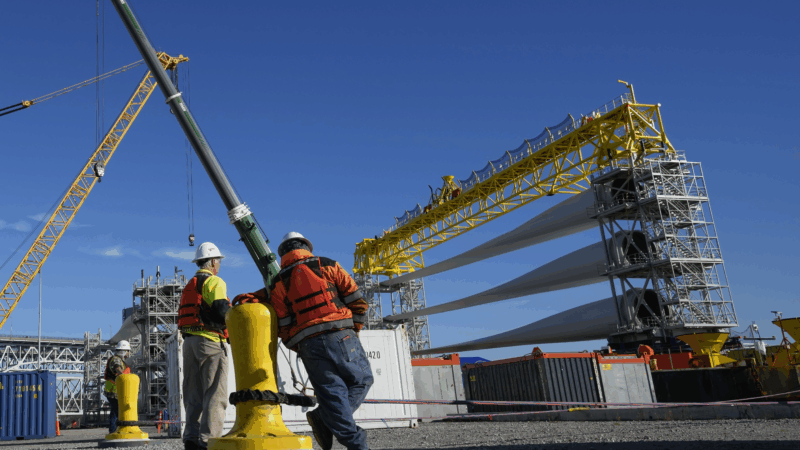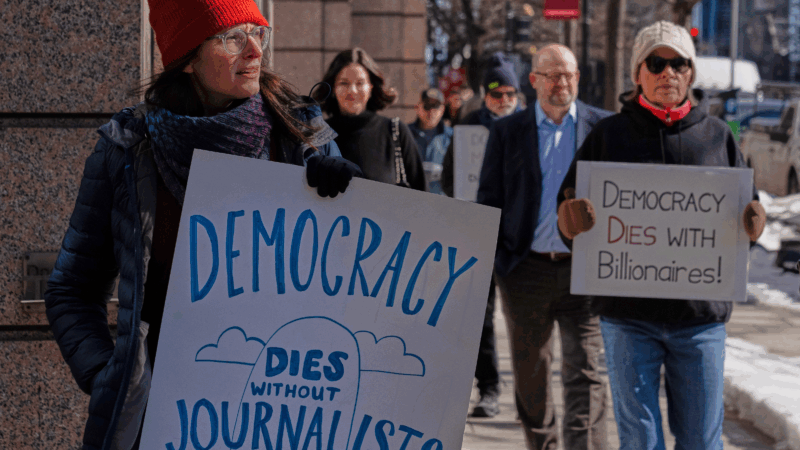Trump administration halts work on an almost-finished wind farm
The Trump administration has ordered companies to stop construction of a wind farm that’s being built off the coast of Rhode Island.
The acting director of the Bureau of Ocean Energy Management, Matthew Giacona, wrote in a letter to one of the developers, a Danish firm called Ørsted, that the government was halting work on the almost-finished project in order to “address concerns related to the protection of national security interests of the United States.” The project is also being developed by Global Infrastructure Partners.
The order to stop work on the Revolution Wind project is the latest move by the Trump administration targeting the country’s renewable energy industry. President Trump, a longtime critic of the wind industry, in January issued a moratorium on new development of offshore wind projects. The Internal Revenue Service recently put out new guidance that makes it harder for companies building wind and solar projects to qualify for federal tax incentives. And the Commerce Department is investigating whether imports of wind turbines and their components threaten national security.
Ørsted said in a statement that it is “evaluating all options to resolve the matter expeditiously,” including legal action.
Revolution Wind is located in federal waters 15 miles south of Rhode Island. Construction started in 2023, and the project has been slated to begin sending power to homes and businesses in Rhode Island and Connecticut starting next year.
“Any pause or uncertainty at this stage could ripple across jobs, contracts, and communities already benefiting from the project,” Erik Milito, president of the National Ocean Industries Association, a trade group whose members include wind project developers as well as oil and gas companies, said in a statement.
“Today, the U.S. has only one fully operational large-scale offshore wind project producing power,” Milito said. “That is not enough to meet America’s rising energy needs. We need more energy of all types, including oil and gas, wind, and new and emerging technologies.”
The Bureau of Ocean Energy Management didn’t respond to messages seeking comment.
Industry analysts have said that limiting renewable energy development amid rising electricity demand threatens to drive up power prices across the country.
“This is not the first time extreme partisan politics has derailed sound energy policy,” Jason Grumet, chief executive of American Clean Power, an industry group, said in a statement responding to the Trump administration’s stop-work order to Revolution Wind. “The unfortunate message to investors is clear: the U.S. is no longer a reliable place for long-term energy investments.”
In April, the Interior Department halted work on an offshore wind project near the coast of Long Island. Interior Secretary Doug Burgum wrote in a letter to the Bureau of Ocean Energy Management at the time that approval of the project, called Empire Wind, “was rushed through by the prior administration without sufficient analysis.”
Construction on Empire Wind resumed in May when the Trump administration lifted the stop-work order. But the disruption was costly for the project’s developer, a Norwegian company called Equinor. The firm recently cut the value of its investment by almost $1 billion, mainly because of “the changes in regulations for future offshore wind projects in the U.S.,” Torgrim Reitan, Equinor’s chief financial officer, said on an earnings call in July.
“For the second time, the Trump Administration has taken unlawful action against a fully permitted offshore wind project under active construction — this time one that is nearly 80% complete,” Liz Burdock, chief executive of the Oceantic Network, an advocacy group for offshore wind, said in a statement about the Revolution Wind project.
“This dramatic action further erodes investor confidence in the U.S. market across all industries and undermines progress on shared national priorities — shipyard revitalization, steel and port investments, and energy dominance,” Burdock said. “In fact, halting work on Revolution Wind will drive up energy costs for consumers, idle Gulf Coast vessel operators that have invested hundreds of millions of dollars in new or retrofitted vessels, and jeopardize the livelihoods of union workers.”
Pentagon says it’s cutting ties with ‘woke’ Harvard, ending military training
Amid an ongoing standoff between Harvard and the White House, the Defense Department said it plans to cut ties with the Ivy League — ending military training, fellowships and certificate programs.
‘Washington Post’ CEO resigns after going AWOL during massive job cuts
Washington Post chief executive and publisher Will Lewis has resigned just days after the newspaper announced massive layoffs.
In this Icelandic drama, a couple quietly drifts apart
Icelandic director Hlynur Pálmason weaves scenes of quiet domestic life against the backdrop of an arresting landscape in his newest film.
After the Fall: How Olympic figure skaters soar after stumbling on the ice
Olympic figure skating is often seems to take athletes to the very edge of perfection, but even the greatest stumble and fall. How do they pull themselves together again on the biggest world stage? Toughness, poise and practice.
They’re cured of leprosy. Why do they still live in leprosy colonies?
Leprosy is one of the least contagious diseases around — and perhaps one of the most misunderstood. The colonies are relics of a not-too-distant past when those diagnosed with leprosy were exiled.
This season, ‘The Pitt’ is about what doesn’t happen in one day
The first season of The Pitt was about acute problems. The second is about chronic ones.







